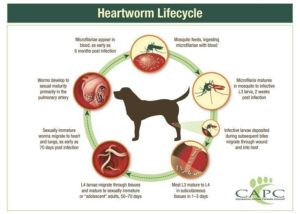Heartworm disease is transmitted to our dogs through the bite of an infected mosquito. Heartworm is no longer considered a regional problem. It has been found in all 50 states, including all parts of California. A heartworm infestation is easy to prevent but difficult and costly to treat.
After the bite from the infected mosquito, it takes about 7 months for the heartworm larvae to mature to adult heartworms inside the dog. They lodge in the heart, lungs and surrounding blood vessels and begin reproducing, with an infestation consisting of as many as 250 worms in the dog’s system. Each worm can grow up to 12 inches long and live for 5-7 years.
The following chart from the Companion Animal Parasite Council™ shows the heartworm lifecycle:

Infected dogs cannot directly pass a heartworm infestation to other dogs in the family or neighborhood. The infection is passed solely through a bite from an infected mosquito.
If your dog becomes infected there will not be any symptoms initially because the larvae are so small but, make no mistake, they are making their way into your dog’s pulmonary artery, heart and lungs. Eventually, damage may not be limited to just these areas and your pet will develop heart disease from the damage these parasites do to the heart. As the heartworms mature, they cause most dogs to develop a cough and become easily winded. With advanced heartworm disease, a veterinarian may hear abnormal lung sounds, the dog may pass out from loss of blood to the brain and the dog may retain fluid. If left untreated, most dogs will eventually die from a heartworm infestation.
To diagnose a heartworm infestation, all dogs, including those on heartworm prevention medication, should be tested annually. Testing twice a year is often recommended for dogs that are highly exposed to mosquitos.
If your dog tests positive for heartworm infestation, your veterinarian will discuss with you the need for staging of the disease for the severity of the infestation and to determine the proper course of treatment necessary for your dog. Treatment can take several months and requires restriction of your dog’s exercise for an extended period of time to give your dog time to rid itself of the dead parasites which can cause damage or death if the dog is exercised during recovery.
Once heartworm has been ruled out through testing, prevention is the key to avoiding a heartworm infestation. There are many heartworm preventatives and our veterinarians will help you choose the right one for your pet’s lifestyle. These medications are given once monthly year-round. We also recommend testing once per year, even with prevention, to ensure that the preventative has been effective in protecting your dog from a heartworm infestation.
